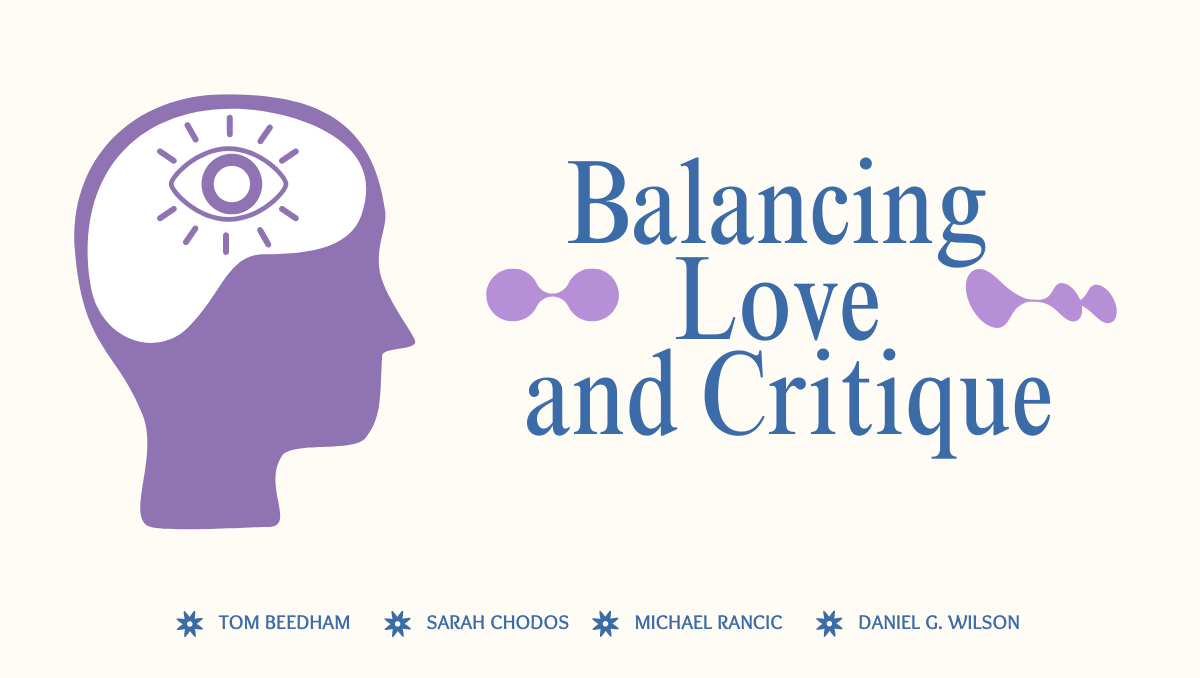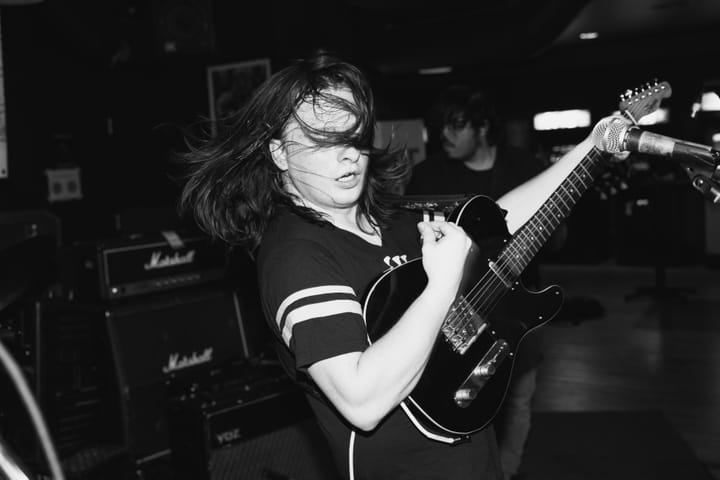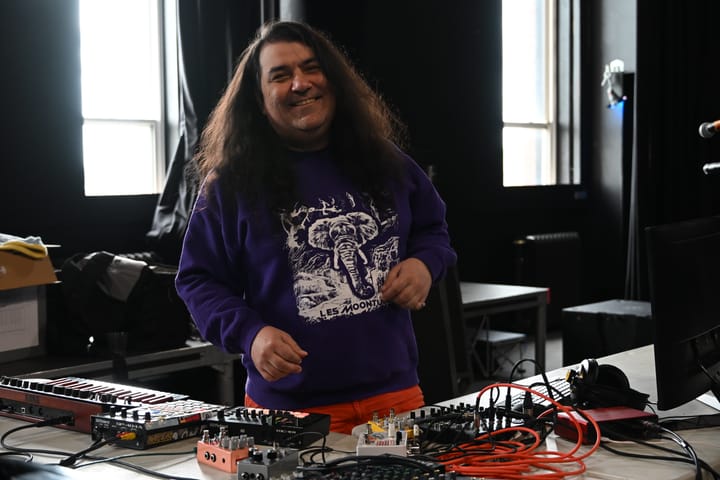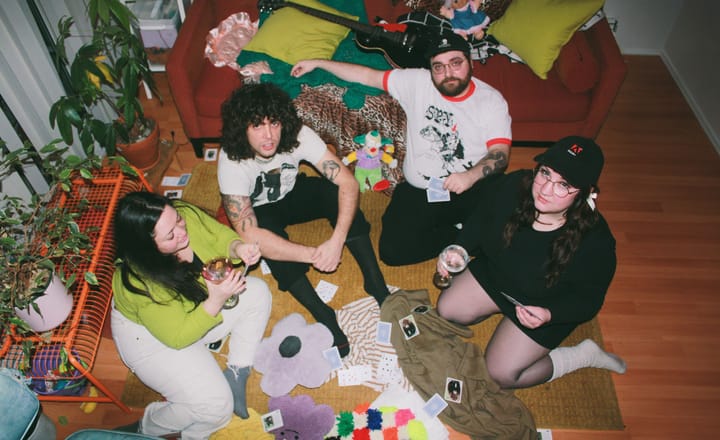
Balancing Love and Critique: A New Feeling Roundtable
As New Feeling’s editorial working group discussed the theme of “Fandom,” we inevitably thought about our own relationship to music as fans. For each of us, enthusiasm for music is what has motivated us to follow the path we’re on now as music journalists, but how we got there and why differs greatly. There’s also a tension inherent in this work – as journalists we are expected to be objective and unbiased in our writing, often represented as “authorities” on music, and yet none of us would be here today if it wasn’t for our own passion. That passion can be a very flawed thing: unchecked it can turn to favouritism or a conflict of interest, and too little can turn to cruelty or a complete disengagement with the people and communities at the heart of these sounds. Navigating such tensions is not easy, but thinking through them can help us better understand how to become better writers and how we can best let our enthusiasm and care be the tools we use to tell stories that matter.
With that in mind, each participant in the roundtable (Tom Beedham, Sarah Chodos, Michael Rancic, and Daniel G Wilson) was asked to think of a question to help drive the conversation, embracing our own unique relationship with and understanding of music fandom and music journalism. We hope this conversation resonates not only with other journalists who are also finding their own balance, but with other music workers and fans alike.
What motivated everybody to start being a music journalist?
Michael Rancic: I got to a point where my opinions and knowledge about music exceeded my capacity to talk to other people about it all. My friends at the time were polite about it but did not share my curiosity or appetite for discovery in the least. Writing became an outlet for me to express my joy about the music I was really into, or really hated. It felt like drawing a line in the sand with my overwhelming enthusiasm and just as soon became a pretty vital part of how I process my life.
Sarah Chodos: So I guess I've always loved to write. Ever since I was able to write, I would spend my spare time writing stories. I had a whole long series of fiction that I was writing from the time I was in about grade two. But then I've always also loved music, and I guess when I got to be a teenager music sort of took over as an outlet and a form of self-expression and it was just this whole community and this whole entity and it wasn't enough just to observe it. After the time with my band I had my first child and then a while later I had my second child, so I engaged with music as a fan because I had to keep jobs with a more reliable source of income. When the pandemic broke out and I was on the CERB I decided why not write for Exclaim!? I had been doing some writing also for a blog put out by the International Association for Studies in Popular Music. So that led to Exclaim! and then Exclaim! led to this and it just feels very much the right thing to do right now. Obviously we would all like a kind of reliable income from, and I think in an ideal world, we would all have a reliable income from writing about music. But for me, money aside, it just feels like the right thing to do. I've made great connections with people and my life is richer for it.
Daniel G. Wilson: I'm on the spot (Laughs). Let me see…for writing in general, similar to Sarah. I've always kind of had a bit of an active imagination from when I was young, always coming up with random stories in my head and my imagination was usually ahead of my abilities. I'm kind of odd. I got into journalism accidentally. I started doing DIY interviews with local Mississauga and some Toronto bands through video. And yeah, one day someone from the scene, Phil Witmer, who was writing for VICE at the time. He reached out to me and asked me if I'd be down to freelance for them.
And so the rest is basically history. As years went on I would do articles here and there and then I got asked if I'd be part of New Feeling.I have a lot of interests, writing being one of them, and I like music. I'm a massive nerd. So it was natural for me to write about music.
Tom Beedham: I actually started writing about music when I was in high school. I was going to local shows just thrown in Lions Club and Optimist halls, restaurant basements and things like this in Georgetown, Ontario. I didn't play any instruments at the time or anything but I wanted to give back to the scene and also just share enthusiasm about some of the stuff that was happening and document it in some way. That led to making a newspaper on eight and a half by 11 inch paper, using the high school’s copier with my girlfriend at the time. I think we did four issues. When I did my undergrad in Guelph I kind of took a break from writing about music at first just to adjust to course loads, but eventually I got involved with the student newspaper, writing record reviews and reviewing concerts from bands touring through town. It kind of paid for my entertainment but also gave me permission to check out new things and engage with music on a level that I wasn’t necessarily getting to just in my group of friends. And I stuck with that until after I graduated, working at the newspaper for another year before moving to Toronto and starting to freelance.
Michael: There's a connection between what Sarah and Dan said in terms of your closeness to what's happening musically is what brought you in, and then for Dan and Tom there's almost this sort of sense of responsibility you had in Mississauga and Georgetown. Like, if you don't document what’s happening at the moment, nobody else will. That’s very cool and very much plays into what drove New Feeling to form in the first place.

How do you separate your personal feelings of an artist as a fan of their work, from how you report on and write about them as a journalist?
Daniel: When it comes to writing about something, reviewing it, or talking about it, engaging with something on a professional level, I generally like to compartmentalize it. My personal feelings might inspire me to talk about a subject in a particular way. I might, for example, be more interested to talk about some noise rock band over a poppier group just because I like noise rock.
I feel that when you're reviewing something you should treat the subject completely “as is” rather than my personal feelings. There's lots of artists that I personally dislike for a variety of reasons that I can still openly say that they make good music and I can say what the merits are and what they do is and I think that's kind of a good rule of thumb to have.
I wanted to ask that question because I think for a lot of writers and reviewers, you can usually tell when they don't leave their personal feelings out the door when they're writing about something and I feel it's an important topic. I mean, we're human, we have personal feelings, but the same for a variety of reasons, but at the same time, it's one of the biggest kinds of conflicts you find when you're dealing with your writing about stuff.
Tom: I don't necessarily think that you should, or even can entirely separate personal feelings for an artist from your writing about them, but what I think is important to do is to acknowledge as much as you can how you're coming to that art. I think first-person writing can be really beneficial because it allows you to explain in a really forward way what your relationship to that artist is, where you were at in your life, but it's often discouraged.
Sarah: By the time I started writing about music I was in a place where I was a little bit removed from music. The Canadian independent music scene is pretty small and a lot of us do know each other, know what I mean? But I was a bit removed because I was a bit older, there was a pandemic, and I wasn't living right in Toronto. When I write I deliberately pick people I don't know and there were a lot of people I didn't know and I often I favoured music I hadn't even heard before.
At the same time, for your integrity you can't just say nice things about everybody. But it is hard. We're a community and we edit each other's work. And we not only have to have thick skin, but also that's how we help each other be better and that's how we all collectively put out the best work that we can. It doesn’t help anyone if we just say the music is fantastic, or if you feel like you can't say anything without feelings being hurt.
Michael: Yeah, even if you don't know somebody I think that there's a respect that you want to approach a work with in order to find that balance of being so immersed and knowledgeable and caring about it, but then also wanting to be able to say what you feel in terms of critique. A lot of what Dan and Sarah were talking about reminded me of how one of the most formative places for me as a writer, even before I had a blog or Twitter, was a web forum. I was on a forum dedicated to a Canadian musician for many years. And the thing that annoyed me about being part of a fandom was that nobody wanted to criticize the work. It was very frustrating to be a part of this community where everyone had this shared sense of ‘this music is great,’ ‘this music has changed our lives,’ but then have zero space or freedom to say if a song or record doesn’t work for you personally. Any kind of constructive critique is seen as ‘negative’ despite where it’s coming from. For me, even when I’m writing about something I don’t like, I’m doing it from a place of enthusiasm. That may seem contradictory, and I think the public’s capacity to understand those nuances has only been diminished in the years since because of how antagonistic the major music press often behaves toward their subjects for clicks and ad money.

I hope that as a music writer my words are interpreted as just those of one person and not given additional weight. Is there a way of writing that best conveys this?
Sarah: I put that question forward because something may or may not resonate with me — it speaks well of it if it resonates with anyone, to be certain — but what resonates more loudly or deeply with me is just about me and not my being more knowledgeable than anyone else. And, you can’t just look at some objective measure like technical proficiency or, heaven forbid, sales, and think that is what makes or breaks “good” music. I don’t want to seem to be writing from a position of having an objective measure at my disposal.
Michael: I don't know that there's any way to control that, from my experience. We have to be comfortable with the fact that people are going to see us as authorities, though maybe less so now because there's just so many music critics out there. When I was a Polaris Prize Juror, I thought for a long time that it was important for me to go through the entire long list and tweet out what I thought about every album for the sake of transparency, and to show that I was listening to the entire thing.
But then musicians kindly pulled me aside afterward and we're like, ‘hey, it's kind of weird to see you airing your feelings about my record so publicly in just a tweet. People look to you, Michael, and there's a certain weight that you have when you're saying things.’ That really struck me because I went into it thinking that I was being responsible, but I wasn't really thinking about how people would feel or whether there was actually value in what I was sharing.
So, you could be very thoughtful, you can put a lot of attention and time into how or what people are gonna take away from your writing, but I think ultimately what we need to do is approach our work with a sense of responsibility, given that people are going to see us as authorities and that what we do can shape somebody's career good or bad — even the stuff that we don't write about. There's a tremendous amount of power and influence there and recognizing that power is something that is an important part of being a good writer, and maybe something other professionals in our field have quickly dismissed or set aside.
Daniel: To go off of what Michael is saying, it doesn’t really matter what you do. When you have essentially a platform that people engage with you generally have a certain level of power whether you like it or not. How much this power translates actually varies but you don't really have much control over that. Even outside of music there's many examples in culture and in life where somewhere randomly some person does one thing and without even their knowledge suddenly, they're essentially like that form of minor celebrity to a degree. All you really can do is just try your best to write and do your subject justice. Respect your subject enough to write with enough knowledge to at least not insult them.
Then it is up to everybody else to decide how they want to take your writing. We gotta just accept that once it's out in the world. It's no longer really in our power to control how people perceive it.

What are your thoughts in terms of the challenges of talking about something only from an aesthetic perspective and what were moments that inspired you to think of this ephemeral stuff we listen to in more material terms?
Tom: We've seen trends come and go where every once in a while publications will allow personal essays written from a first-person perspective, usually from the perspective of a marginalized gender or race or sexuality. That material is good and we need to have that perspective In dialogue with everything else that's happening. But it frustrates me that in practice it ends up being very liberal, exploitative and rarely considers a class perspective. So the opportunity for consciousness raising is very limited.
Sarah: When we get beyond the aesthetics is when I think writing about music becomes important. Understanding how music engages with society and how it engages with politics and how there's this important and intrinsic interplay with music and whatever's going on with the world.
I think, oddly enough, I got into music and I got into shelter work because I was going to a lot of shows and hanging out in bars and meeting people who were struggling and thinking I want to do work that helps people. So I did that for a number of years. I don't know if I really helped anybody, it's a messed up system, obviously, and then when the pandemic broke out then I think I felt this real pull to get back into music. Things were coming together. I was trying to understand just kind of everything that was wrong, what people are struggling with right now, what's going on in the world, what's going on on all levels and how important music is and how important that is to music.
Daniel: Music is something we do, right? Take punk as an example. Punk is not just an outfit. It's not just loud music. It's also an entire global culture that has existed for decades that extends from a mix of various cultures coming together, reaction on reaction, artistic and non-artistic together. To write about music is to write about politics, to write about health, to write about the state of the world, about people’s sorrows, their hopes and dreams; to write about culture itself. That is music. I've always seen music as being part of a broader whole it's just I hadn't had a chance to express that through writing in my younger years.
Also speaking to the labour aspect, as a musician and journalist, it goes along with my philosophy of respecting the subject enough to provide a thoughtful and well researched opinion. Acknowledging what goes into the creation of a piece of work that a human created with their effort and labour and respecting it enough to know that it deserves proper engagement and criticism and to understand why it might be the way it is.
Michael: That's a good way to kind of describe how many different options there are relating to music as a cultural element. For me, as a struggling freelancer who has never had a staff position, it was very hard to figure out ways to distinguish myself from all my competitors and colleagues when I was starting out. Eventually I came to the realization that no one was really talking about how the industry was soliciting governments to put money into music scenes and cities so they could leverage music scenes for tourism and prop up the recording industry.
I was also very lucky that I had some editors who allowed me to write about this very “inside baseball” stuff. That was a very interesting experience because as we’re talking about navigating being fans and journalists, I was really crossing some lines with what I was doing between being a journalist and an activist. I started a petition that got someone removed from the Toronto Music Advisory Committee and was just writing about things as I saw them and how extractive these policies seemed. Not really caring about my own bias, just saying ‘this is bad and here's why you should care about it,’ because being quiet about it, or trying to be ‘balanced’ in my reporting seemed like a path to injustice.
That period really helped me see how interconnected all of these struggles are, between labour, gentrification, and industry. Going through my own labor struggles at the same time being a precarious writer really made it easy for me to relate to musicians in that way, especially because I had chosen very early on that I wanted to write about music locally. I was very fortunate that people wanted to speak to me and reciprocated my own enthusiasm.
Read more

Sentries: Multifaceted Noise Rock

Step Into Little Stone Crow's World

